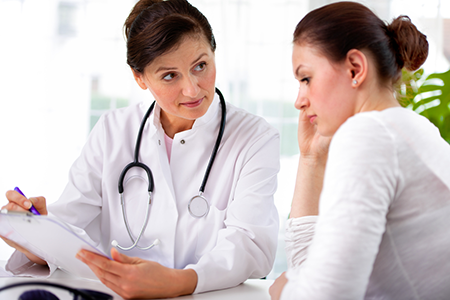
It's estimated that 70% of women will experience breast pain at some point in their lives, according to an article in BMJ Clinical Evidence. This common women's health concern can be either cyclical - meaning it comes and goes monthly along with your menstrual cycle - or noncyclical.
Breast pain has numerous causes, and mild, cyclical breast pain usually isn't reason to worry. In most cases, you can take steps to reduce or relieve this occasional pain. Find out more about breast pain and how your OB GYN can help.
Causes of cyclical and noncyclical breast pain
One of the most common reasons for breast pain is normal changes in your hormones throughout the month. This cyclical breast pain is usually worst around the time of your menstrual cycle, only lasts for a few days, and then resolves on its own. Taking synthetic hormones - such as those found in birth control pills - can cause similar breast pain symptoms.
When breast pain is noncyclical or happens at times not related to your menstrual cycle, some causes could include:
- Pain due to an ill-fitting or unsupportive bra, especially if you have larger breasts
- An injury to the breast due to sports or another impact
- Pain that is coming from underneath the breast - such as a pulled muscle in the ribs
- Breastfeeding-related pain, including a plugged milk duct, sore nipples, pain during letdown, or mastitis
- Non-cancerous breast cysts
- Breast infection
- Pregnancy
- Breast cancer
While many women worry that breast pain means they might have breast cancer, this is rare. According to the National Breast Cancer Foundation, breast pain is not one of the main symptoms of breast cancer. Occasionally, a less-common type of breast cancer - calling inflammatory breast cancer - may cause some breast pan. However, this breast pain happens along with other symptoms.
Breast pain treatment
If you have mild breast pain associated with your menstrual cycle, you can often care for yourself at home with over-the-counter medications and lifestyle changes.
Some tips to manage cyclical breast pain include:
- Use over-the-counter pain relievers, like acetaminophen, ibuprofen, or naproxen sodium
- Wear a supportive bra or get fitted for a bra if you aren't sure you're wearing the right size
- Use birth control pills or other hormone methods of birth control consistently
- Try reducing or eliminating the amount of caffeine in your diet
- Use heat or cold compresses on the breasts
When to talk to your OB GYN
When breast pain isn't related to your menstrual cycle or is noncyclical, it's time to talk with your OB GYN, according to the American College of Obstetricians and Gynecologists. Because noncyclical breast pain can be caused by several health conditions, an OB GYN can help get to the source of the problem.
Based on your symptoms, your OB GYN can perform an exam and additional tests to diagnose the cause of your breast pain. Then, you can get the right treatment. Depending on the cause, your OB GYN may be able to help resolve your breast pain for good - such as the case of an infection or cyst - or provide treatment to help make it more manageable.
